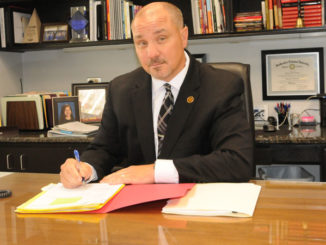
By John Maginnis
The Louisiana Way is back, if it ever left. The term was famously used by federal prosecutors in the 2000 riverboat racketeering trial of former Gov. Edwin Edwards to describe the corrupt system of bribery, inside dealing and influence peddling by which state politics had operated for decades.
The theme was reprised in the convictions of former Congressman William Jefferson and relatives and associates involved in a family criminal enterprise.
Gov. Bobby Jindal’s election and his immediate focus on ethics reform was supposed to change that, so that corporations considering doing business here would not fear being shaken down by some crooked state or local politician.
Resulting disclosure and conflict-of-interest laws dramatically increased the state’s national rankings in those areas and improved its image of good government. Which is good because that might distract outsiders from noticing the wave of criminal prosecutions and investigations of many local and some state officials in the past year.
Louisiana politicians are keeping the FBI and U.S. Attorneys as busy as ever of late, in what seems a competition among the Eastern, Western and Middle districts to expose the most official corruption in a range of complexity, variety and irony.
For the latter it’s hard to top former Winn Parish Sheriff Bodie Little’s drug trafficking conviction last week. A federal jury in Shreveport found that, as sheriff, Little changed sides in the war on drugs by running a meth distribution ring with ten others. He was also accused of obtaining driver’s license information of potential customers of a female dealer with whom he was allegedly having an affair.
Little’s verdict was returned on the same day that Ouachita Parish Sheriff Royce Toney was arrested in his office by U.S. Marshals and charged with 22 counts of conspiracy, computer fraud, identify theft and obstruction of justice. Prosecutors say he conspired to gain access to a sheriff’s office employee’s e-mail account and phone records, and then tried to cover up the snooping.
At the other end of the state, former Plaquemines Sheriff Jiff Hingle’s transgression was more old school, in that he accepted cash bribes from a parish contractor. Hingle then cooperated with the feds and wore a wire to catch the contractor, Aaron Bennett, giving another payoff. Now Bennett, talking to investigators, could shed light on his past dealings with politicians, including former New Orleans Mayor Ray Nagin. His acceptance of freebies and personal business dealings while in office have attracted the interest of a federal grand jury.
Already chatting up the feds is Nagin’s former technology chief Greg Meffert, who pleaded guilty to taking kickbacks from a city vendor, who paid for a Nagin family vacation to Jamaica.
Meanwhile, U.S. Attorney Jim Letten’s office is deep into its investigation of former Jefferson Parish President Aaron Broussard, already accused of public payroll fraud, with larger questions swirling over alleged payments from businessmen and a parish landfill contract.
The Jindal administration itself is not immune, after Letten last week announced guilty pleas from two former employees of a company running the state’s home elevation grant program. State Attorney General Buddy Caldwell earlier indicted a consultant for allegedly bribing a top manager of the program, a state employee, to provide private information about eligible homeowners that could be sold to elevation contractors.
You would think that with so many real schemes going on that the feds would not have to make one up. Yet it was cash and gifts from an FBI undercover operative, posing as a representative of a fake garbage-can-cleaning business, which led to convictions of six municipal officials in the River Parishes.
The FBI sting operation, Operation Blighted Officials, culminates in the current trial of the reputed ringleader, former St. Gabriel Mayor George Grace, whom a witness described as “godfather” of the small-town pols.
His colleagues paid dearly for playing in the FBI world of make-believe. Former New Roads Mayor Tommy Nelson took only $20,000 in cash and gifts, but, because he agreed to a deal to reap millions in imaginary profits, he received a sentence of 11 years, real time.
Despite the trappings of ethics reform, the ease with which mayors, police chiefs and councilmen were corrupted by a fantasy scheme sends a sorry signal of what other politicians might be inclined to do, given the opportunity.
The ethics climate at the top levels of state government may have improved, but down where business is done with state and local officials, old ways are hard to leave behind.




Be the first to comment